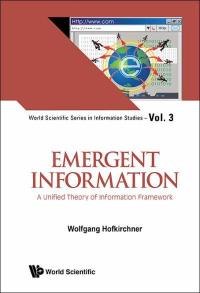Wolfgang Hofkirchner
EMERGENT INFORMATION: A UNIFIED THEORY OF INFORMATION FRAMEWORK
Hackensack, NJ, World Scientific Publishing (Hardcover: 274 pp, 70$)
The 3th of the World Scietific Series in Information Studies edited by Mark Burgin
At the dawn of the information age, a proper understanding of information and how it relates to matter and energy is of utmost importance for the survival of civilization. Yet, attempts to reconcile information concepts underlying science and technology with those en vogue in social science, humanities, and arts are rather rare. This book offers a new approach, departing from fragmented information concepts.
Many academics refrain from undergoing unifications, as most undertakings are reductionistic. This book contends that it is the noble task of an as-yet-to-be-developed science of information to go one step in the direction of a unified theory of information without falling back into neither reduction nor anthropomorphisation.
To be able to succeed in an ambitious task like this, the book advocates the application of complex systems theory and its philosophical underpinnings. Information needs to be interpreted in terms of self-organisation to do justice to the richness of its manifestations. The way the book does so will provide the reader with a deep insight into a basic feature of our world. (more…)



